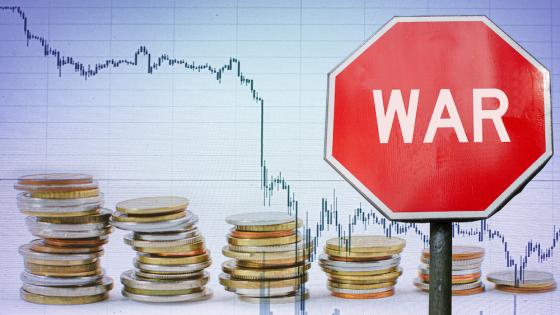With Russia’s invasion of the Ukraine, a new age has begun. The last vestiges of the old order – the global liberal, market-based, democratic order – have vanished. We cannot yet recognise the contours of the new age, but the alternatives we face are coming into view.
The old order was based on a few powerful ideas:
- Globalisation and technological progress, working in free economic markets, promote material prosperity in aggregate worldwide.
- Since this prosperity can be – and, over the past few decades, indeed has been – accompanied by inequality, social fragmentation, and environmental degradation, globalisation and technological progress need to be ‘humanised’ through global collective action.
- Humanised globalisation and technological progress promote the public interest when pursued in the context of liberal democracies.
Russia’s invasion of Ukraine – along with the resulting Balkanisation of finance, trade and technical innovation, as well as the upending of energy, raw materials, and food markets – now appears to have laid the old world order to final rest. The nature of global problem-solving has been called into question.
The current geopolitical crisis comes on top of other major global crises, such as climate change and the on-going COVID pandemic, along with the many other threats waiting in the wings – biodiversity loss, financial instability, antimicrobial resistance, water, energy and food insecurity, digital disruption and manipulation, and much more. These crises, actual and potential, will not go away just because there happens to be a war in Ukraine.
At a crossroads
We now stand at a crossroads, facing starkly divergent pathways into the future. On the one hand, there is the prospect of a Toxic Anthropocene, marked by deglobalisation, a collapse of global collective action, retreat into nationalisms, environmental collapse, and the rising danger of large wars, including a nuclear one. On the other, there is the possibility of a Benign Anthropocene, which mobilises a transnational collective spirit for addressing the major global problems of our time – including climate change, world war, extreme poverty, and pandemics.
The road to the Toxic Anthropocene is in full view. Russia and NATO are watching one another intently for any sign that some self-defined red line has been crossed, amounting to a declaration of war. Escalation of economic sanctions or of NATO assistance to the Ukrainian armed forces can could easily come to be considered in this light. In the fast-paced modern warfare, pre-emptive strikes – along with attempts to pre-empt the pre-emptive strikes – can confer vital military advantage. Russian financial cyber-retaliation for Western financial sanctions are well possible, with devastating consequences for both sides. Each military escalation would be accompanied by a psychological escalation of hate-filled narratives, justifying the escalation, with both sides believing, in the words of Robert Jervis, “that with the infliction of a bit more pain and the running of a bit more risk, the other side [will] back down”. In short, the road to hell is obvious.
The road to a Benign Anthropocene is hard to detect in time of war. To find it, we must ask ourselves what, realistically, a mutually beneficial outcome would look like. The answer needs to be formulated so that all parties can themselves recognise the mutual benefits.
In general terms, this outcome is a new world order that vouchsafes for everyone the opportunity to live in peace and material prosperity, with a sense of personal agency (the ability to shape one’s destiny through one’s own efforts) and social solidarity (thriving communities), within planetary boundaries.1 If we are to reach a Benign Anthropocene, then the nations of the world clearly need to formulate strategies that lead in this direction.
That is not what is happening now. Russia’s invasion of the Ukraine was an unprovoked act of aggression that is leading to the loss of many innocent lives, along with further misery from the implications felt worldwide. The invasion has been accompanied by a Stalinisation of Russia,2 bringing into stark relief the conflict between what can broadly be called autocracies and liberal democracies. Needless to say, a Benign Anthropocene cannot be achieved by rewarding aggression abroad with suppression at home.
Nevertheless, politicians around the world must beware of engaging in cycles of violence that are fuelled by increasingly divergent worldviews, making a benign outcome ever more remote. Instead, at each stage of the conflict, one’s aim must be an ultimate state in which all people, on all sides of this conflict, can live in dignity and self-respect, in thriving communities, empowered to make a distinctive and valuable contribution to humanity and the sustainability of our planet. This is the central challenge of our age.
In order to meet this challenge, we need to ensure that the narratives underlying our actions are constructive (guided by a Benign Anthropocene), rather than destructive (leading towards a Toxic Anthropocene).
The power of narratives
All purposeful activities – political, military, economic, and social – are guided by value-driven narratives. These narratives help us understand our circumstances, focusing our attention on particular events and particular causal relations whereby we seek to predict the future. The narratives are driven by moral values that motivate us to action.3
Narratives are our only way of understanding the world around us. There is no such thing as access to the world ‘as it really is’. All we have is our understanding of the world through the prism of narratives. Since a narrative is inevitably a simplification of reality, its choice of events and causal relations is inevitably selective, promoting confirmation bias.
The recognition of our narrative-dependency does not mean that the choice of narratives is arbitrary. Some narratives can be recognised as out of touch with empirical evidence. Nor does this recognition imply moral relativism. Narratives based on grievance and victimhood can be identified as destructive, since they lead to conflict; whereas narratives based on respect and compassion are constructive, since they lead to cooperation within and across group boundaries.
At present, the two dominant narratives lead us down the road to conflict. In the Western narrative, Mr. Putin has expansionist ambitions aimed at recreating the Soviet Union; he uses nuclear, chemical and biological threats as means to achieve these ambitions; NATO is a defensive alliance that does not threaten Russia; and meeting Russian aggression with graduated economic sanctions and increased military spending will lead to either Mr. Putin conceding or his removal from office. This narrative is driven by moral outrage at Russian aggression and the need to punish the injustice to the Ukrainian people.
In the Russian narrative, NATO expansion into Eastern Europe and its growing association with Ukraine pose an existential threat to Russia. This narrative focuses on particular events that confirm this interpretation: the Bucharest Summit in 2008, at which President Bush announced that Georgia and Ukraine would become NATO members; US support for the uprising that caused Victor Yanukovych to step down as Ukraine’s pro-Russian President; President Trump’s decision in 2017 to sell “defensive weapons” to Ukraine; the Black Sea naval exercise that was co-hosted by the US and Ukraine in July 2021; and the US-Ukraine Charter on Strategic Partnership that was signed in November of that year. This narrative is also driven by moral outrage.
Conflictual narratives (Ulug et al. 2020) all share a set of common characteristics. First, one’s identity is defined in opposition to another social group, so that an adversarial dualism arises. Second, in this context, one sees oneself as a victim of grave injustice at the hands of the adversary. Third, the adversary is demonised and possibly dehumanised, in the sense that one attributes more value to the lives of the in-group than the outgroup. And finally, in the light of one’s own victimhood and one’s adversary’s demonisation, one feels justified in committing acts of violence.
The quest for constructive narratives
To resolve the current military conflict and pursue the road to a Benign Anthropocene, it is essential to seek constructive narratives. Such constructive narratives are focused on building a flourishing future – one where people construct social, political and economic systems that promote the wellbeing of all, within thriving communities and a thriving natural world. Such narratives promote the spirit of affiliation and care within one’s national, religious, and cultural groups and they promote tolerance, respect, empathy, and perspective-taking with respect to other groups.
A focus on the beneficent future leads to socially beneficial construals of the past, ones that generate hope for progress in the conduct of human affairs and aim to resolve transnational problems transnationally. These construals of the past rest more on role-reversal than self-confirmation. A focus on the future also leads to an appreciation of the need to live in harmony with the natural world.
Constructive narratives may be aimed at the defeat of dictatorial leaders, but they are never aimed at the humiliation of their people.
On the contrary, they aim to build a world in which all people – pursuing their diverse cultures, religions, and ideologies – are able to achieve material prosperity through a sense of free personal agency, embedded in nourishing societies within planetary boundaries. These objectives are enshrined in the United Nations Universal Declaration of Human Rights.4
Adopting constructive narratives – that will inevitably differ from culture to culture – does not ensure a Benign Anthropocene, for other parties may choose to be guided by conflictual narratives. But without constructive narratives, a peaceful, inclusive, and prosperous world is impossible to achieve. Keeping this important truth in mind is as important in the further conduct of the Ukraine war as it is for addressing all our other major collective problems, from climate change to pandemics.
References
Akerlof, G, and D J Snower (2016), “Bread and Bullets”, Journal of Economic Behavior & Organization 126: 58-71.
Lima de Miranda, K and D J. Snower (2020), “Recoupling Economic and Social Prosperity,” Global Perspectives 1(1): 1-30.
Shiller, R (2017), “Narrative Economics”, VoxTalk, 3 April.
Ulug, O, B Lickel, B Leidner and G Hirschberger (2020), “How do conflict narratives shape conflict- and peace-related outcomes among majority group members? The role of competitive victimhood in intractable conflicts,” Group Processes and Intergroup Relations 25(4).
Endnotes
1 These fundamental human needs are measured by the SAGE dashboard for many developed and developing countries by (Lima de Miranda and Snower 2020), where SAGE stands for Solidarity, Agency, GDP and Environmental sustainability.
2 See https://www.economist.com/leaders/2022/03/12/the-stalinisation-of-russia
3 For an analysis of narratives along these lines, see Akerlof and Snower (2016) and Shiller (2017).
4 https://www.un.org/en/about-us/universal-declaration-of-human-rights



